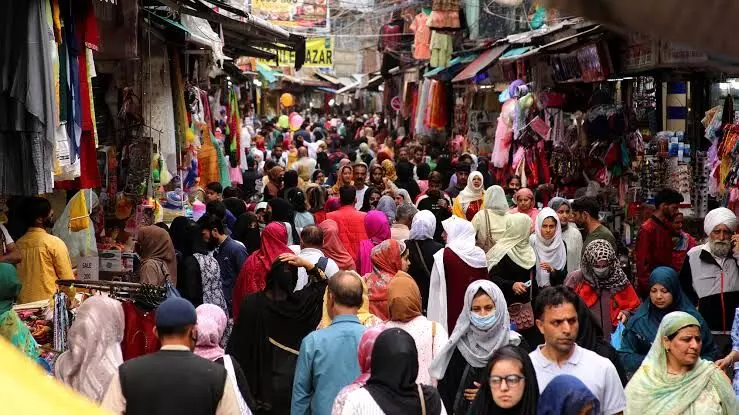Eid’s economic impact: From small sweets shops to fabric sellers, everyone benefits in Hyderabad
Eid is more than just a festival - it is an economic engine that fuels businesses, creates temporary employment and sustains livelihoods
By Anoushka Caroline Williams
Eid’s economic impact: From small sweets shops to fabric sellers, everyone benefits in Hyderabad
Hyderabad: As the crescent moon signals the arrival of Eid, the streets of India come alive with an energy unlike any other. From the bustling lanes of Delhi’s Chandni Chowk to the vibrant bazaars of Hyderabad’s Charminar, shopkeepers prepare for a surge in customers, tailors work late into the night, stitching festive outfits, and sweet shops struggle to keep up with the demand for sheer khurma and seviyan.
Eid is more than just a festival - it is an economic engine that fuels businesses, creates temporary employment and sustains livelihoods across the country.
A boon for small businesses and local markets
For many small traders, Eid accounts for a significant portion of their annual earnings.
Abdul Raheem, a garment shop owner in the General Bazaar of Hyderabad, speaking to NewsMeter, said, “Eid is our peak season. Sales go up by nearly 60-70 per cent, and we hire extra workers to manage the rush. The entire supply chain—from fabric wholesalers to tailors—benefits from the season.”
Footwear, cosmetics and jewelry businesses also see a major boom. According to industry estimates, the demand for traditional clothing such as kurta-pajamas, shararas and embroidered hijabs spikes by 40-50 per cent in the weeks leading up to Eid. With e-commerce platforms offering discounts, even online sales witnessed a sharp increase during this period.
Confectioners and dairy farmers thrive
No Eid is complete without sweets, and this spells good news for confectioners and dairy farmers. The demand for milk, dry fruits and sugar rises exponentially. In cities like Mumbai and Kolkata, famous sweet shops report a 30-50 per cent increase in sales during Eid.
Dairy farmers, too, benefit from the season. Abdul Gani, a milk supplier from Hyderabad, noted, “Households buy extra milk for sweets and desserts. Our sales increase by 20-30 per cent in the days leading up to Eid.”
Employment opportunities and seasonal jobs
Eid’s economic impact is not just limited to business owners.
It creates temporary jobs for thousands, from daily-wage labourers to street vendors. In Hyderabad, women from self-help groups earn extra income by making homemade snacks and pickles for Eid gatherings. Textile mills and tailoring shops recruit additional hands to manage bulk orders. Even rickshaw pullers and auto drivers see increased earnings as people flock to markets for last-minute shopping.
Eid al-Adha and the livestock market
Eid al-Adha, the festival of sacrifice, brings an economic boost to India’s livestock sector. Cities like Bhopal, Jaipur, and Hyderabad witness thriving cattle markets where farmers sell goats, sheep, and buffaloes. The demand for livestock pushes prices up, benefiting rural farmers who depend on these sales for their livelihood.
Impact on the hospitality and travel industry
With families coming together for celebrations, the travel and hospitality industry also sees an uptick. Bus and train tickets get booked well in advance, and flights to cities with large Muslim populations see an increase in demand. Hotels and restaurants introduce special Eid menus, catering to the festive mood. Food delivery platforms also report higher orders as people indulge in festive meals.
A festival that moves the economy
While Eid is deeply rooted in faith and tradition, its economic footprint is undeniable. It fuels consumer spending, strengthens local economies, and provides employment opportunities, making it one of the most commercially significant festivals in India. “Festivals like Eid are a great example of how cultural traditions drive economic activity,” said economist Dr Aarna Mehta. “They support a wide range of businesses, from local artisans to large retail chains.”
As India prepares for yet another grand Eid celebration, the festival’s economic ripples will be felt far and wide, touching lives and sustaining businesses in ways both big and small.